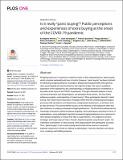Is it really “panic buying”? Public perceptions and experiences of extra buying at the onset of the COVID-19 pandemic
Abstract
Shopping behaviour in response to extreme events is often characterized as “panic buying” which connotes irrationality and loss of control. However, “panic buying” has been criticized for attributing shopping behaviour to people’s alleged psychological frailty while ignoring other psychological and structural factors that might be at play. We report a qualitative exploration of the experiences and understandings of shopping behaviour of members of the public at the onset of the COVID-19 pandemic. Through a thematic analysis of semi-structured interviews with 23 participants, we developed three themes. The first theme addresses people’s understandings of “panic buying”. When participants referred to “panic buying” they meant observed product shortages (rather than the underlying psychological processes that can lead to such behaviours), preparedness behaviours, or emotions such as fear and worry. The second theme focuses on the influence of the media and other people’s behaviour in shaping subsequent shopping behaviours. The third theme addresses the meaningful motivations behind increased shopping, which participants described in terms of preparedness; some participants reported increased shopping behaviours as a response to other people stockpiling, to reduce their trips to supermarkets, or to prepare for product shortages and longer stays at home. Overall, despite frequently using the term ‘panic’, the irrationalist connotations of “panic buying” were largely absent from participants’ accounts. Thus, “panic buying” is not a useful concept and should not be used as it constructs expected responses to threat as irrational or pathological. It can also facilitate such behaviours, creating a self-fulfilling prophecy.
Citation
Ntontis , E , Vestergren , S , Saavedra , P , Neville , F , Jurstakova , K , Cocking , C , Lay , S , Drury , J , Stott , C , Reicher , S & Vignoles , V 2022 , ' Is it really “panic buying”? Public perceptions and experiences of extra buying at the onset of the COVID-19 pandemic ' , PLoS One , vol. 17 , no. 2 , e0264618 . https://doi.org/10.1371/journal.pone.0264618
Publication
PLoS One
Status
Peer reviewed
ISSN
1932-6203Type
Journal article
Description
Funding: The research presented here was supported by a QR seed grant by the School of Psychology and Life Sciences at Canterbury Christ Church University awarded to Evangelos Ntontis, and by a UKRI grant awarded to John Drury, Clifford Stott, Stephen Reicher, Fergus Neville and Evangelos Ntontis (ES/V005383/1).Collections
Items in the St Andrews Research Repository are protected by copyright, with all rights reserved, unless otherwise indicated.

